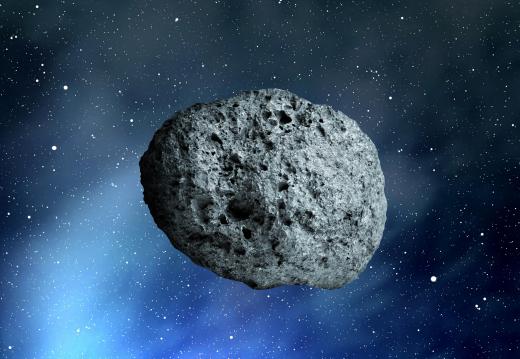What Factors Determine the Damage of an Asteroid Impact?
 Michael Anissimov
Michael Anissimov
The most important factor determining the damage of an asteroid impact is the energy it releases upon impact. This is calculated by multiplying half the asteroid's mass by the square of its velocity. The typical range of asteroid velocities is quite limited — most measured values are between 12 and 20 km/sec (7.5 - 12.4 mi/sec). Comets are much faster, ranging between 50 and 70 km/sec (31 - 43.5 mi/sec).
Yet, what asteroids lack in speed, they make up for in density -- while comets are thought to made up of mostly ice, with a density of only 1000 kg/m3, asteroids made of solid rock have a density of about 3000 kg/m3, whereas the rarer (8%) metallic asteroids have a density of 8000 kg/m3. These density values intimately effect the final consequences of the asteroid impact.

Other factors influencing the environmental effects of an asteroid impact include its size (obviously), angle of impact (the most probable is 45 degrees), and impact surface (water, silicate rock, or crystalline rock). The size of asteroids is distributed along a power law, where asteroids above a certain size are exponentially rarer than smaller ones.

Asteroids about a meter in diameter are thought to enter the Earth's atmosphere about once every month, leaving 100 ft (30 m) craters in their wake. Asteroids a kilometer in diameter impact only once every million years or so, releasing as much as 100 gigatons of TNT, 200 times stronger than the most powerful nuclear weapon ever tested. Such an impact would shatter glass windows as far as 500 km away, leaving a 20 km (12 mi) crater. The largest asteroid impact in the last 4 billion years is thought to be the asteroid which created the Vredefort crater in South Africa, with a diameter of about 20 km (12 mi).
Large asteroids do their damage in one of three ways: the initial air blast and thermal wave, which can be strong enough to incinerate forests; the ejecta, which can bathe continent-size areas in magma, and the blocking out of the Sun due to soot particles in the upper atmosphere. The last factor is most terminal for life, as without photosynthesis, food chains collapse, and only decomposers and scavengers would be able to survive for more than a decade. In the case of impacts with asteroids over 20 km (12 mi) in diameter, scientists believe that all complex life (including all animals and higher plants) would be wiped out, leaving nothing but microbes, similar to the situation on Earth around a billion years ago.
AS FEATURED ON:
AS FEATURED ON:












Discussion Comments
I read in a geology book that the Sudberry crater in Ontario, Canada was created by an exploding meteor, they said it had the power of 10 billion nuclear bombs the size of the one dropped on Hiroshima Japan.
The bomb dropped on Hiroshima had an explosive yield of 67 trillion joules (67 terrajoules) multiply that by 10 billion and the total blast yield from the creation of the Sudberry crater was 670 zettajoules or 670 sextillion joules (that's 6.7E23). As a comparison, the world consumed about .5 of a zettajoule of energy in 2010.
@strawCake - You have to admit there is something fun about disaster movies! It's interesting to imagine what you would do if you were in that kind of a situation.
Movies aside I don't think we need to worry too much about earth being hit by an asteroid. There are a lot more likely events to spend time worrying about!
@miriam98 - I think that no matter the year, the doomsday predictions will continue. Personally, I believe that a massive asteroid impact is hundreds of years away, but already there are those who are predicting that 2036 will finally be the year.
These people believe that 2012 will pass without a brush with destruction but that in 2036 an asteroid the size of two football fields will smash into planet Earth, bringing about massive destruction and possible extinction.
Scientists caution that it is a miniscule chance. However, I believe that you can count on the media to hype up mass hysteria – and on Hollywood to profit from the fears.
Every now and then I will hear about the possibility of a near Earth asteroid impact by an asteroid passing very close to the Earth. Recent misses include an asteroid that swung within 7,500 miles above the Earth’s surface, which sounds like a big number, but I suppose it is considered a close call by scientists.
The possibility of an asteroid actually hitting the Earth soon is considered remote because it would be burned up in the Earth’s atmosphere, depending on its size and density, but impacts have happened in the past and they will certainly happen again.
I just hope that an impact doesn’t occur in my lifetime.
I remember a few years ago movies features asteroids hitting the earth were pretty popular. "Deep Impact" and "Armageddon" come to mind. I think both of those movies came out within months of one another!
Disaster movies are always popular but it seems like the theme changes every few years. For awhile it was hurricanes and storms, then it was asteroids, and lately it's been 2012! I think a lot of people worry that these sorts of disasters will happen and it’s somehow cathartic for them to watch movies about it.
Post your comments